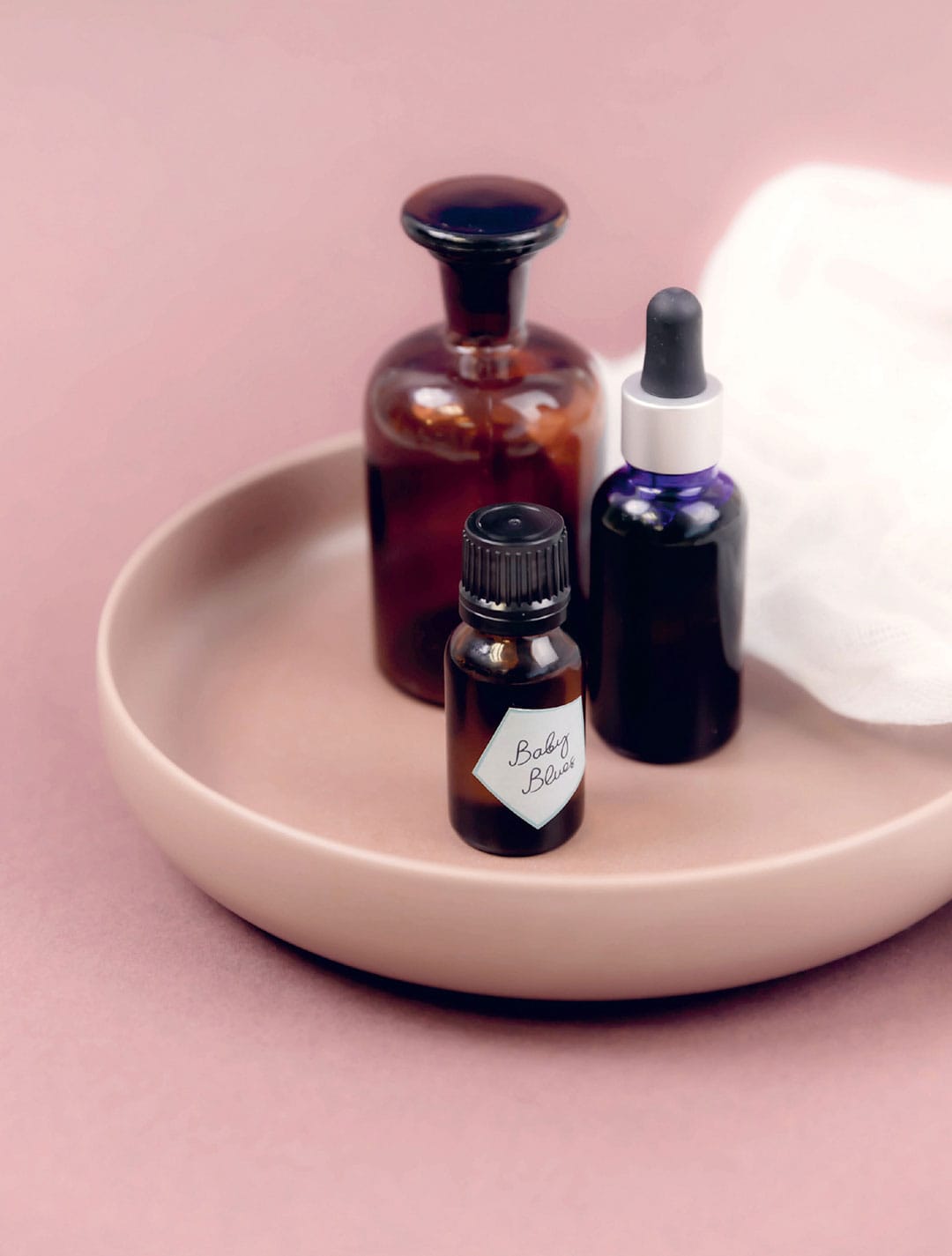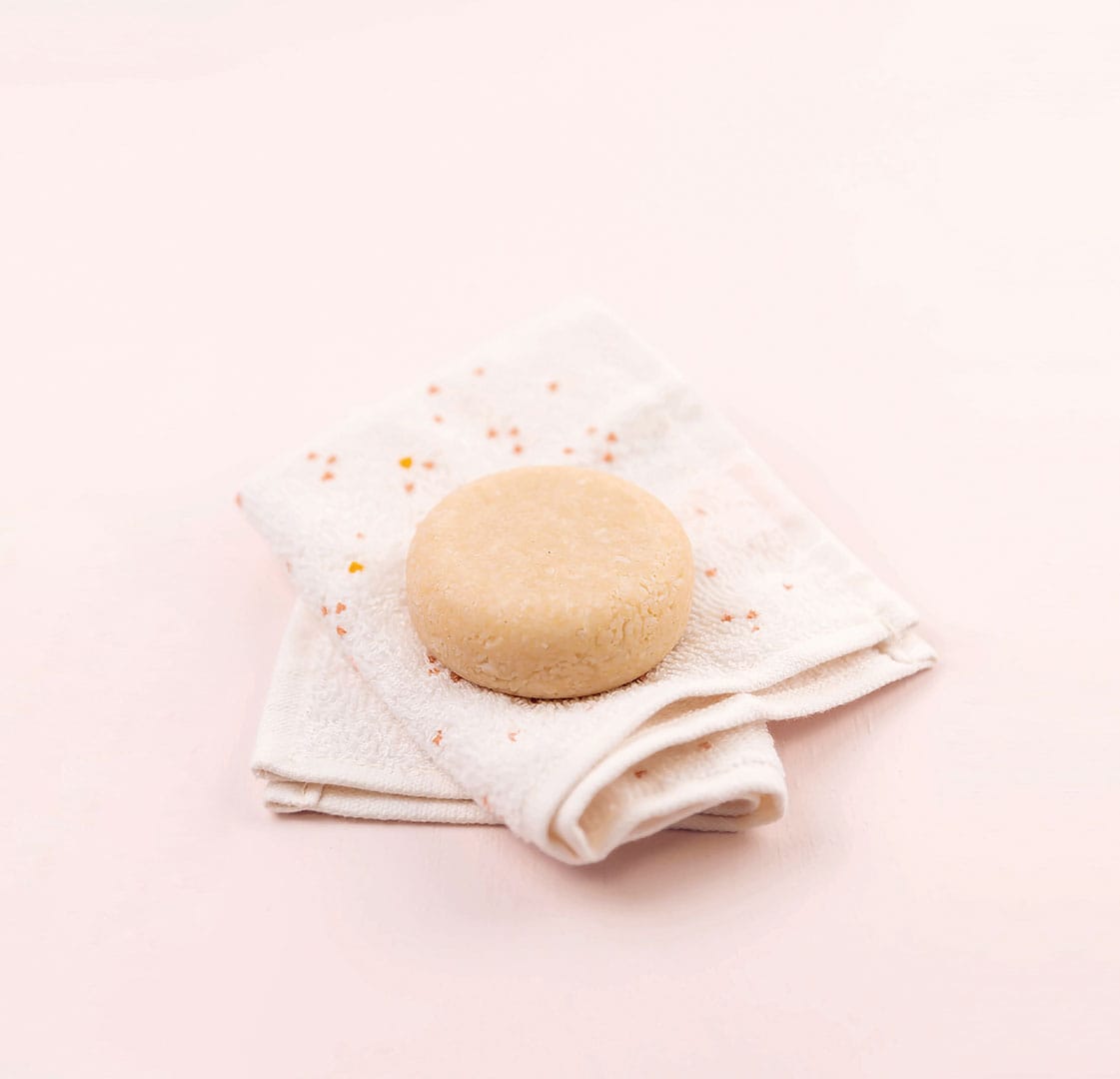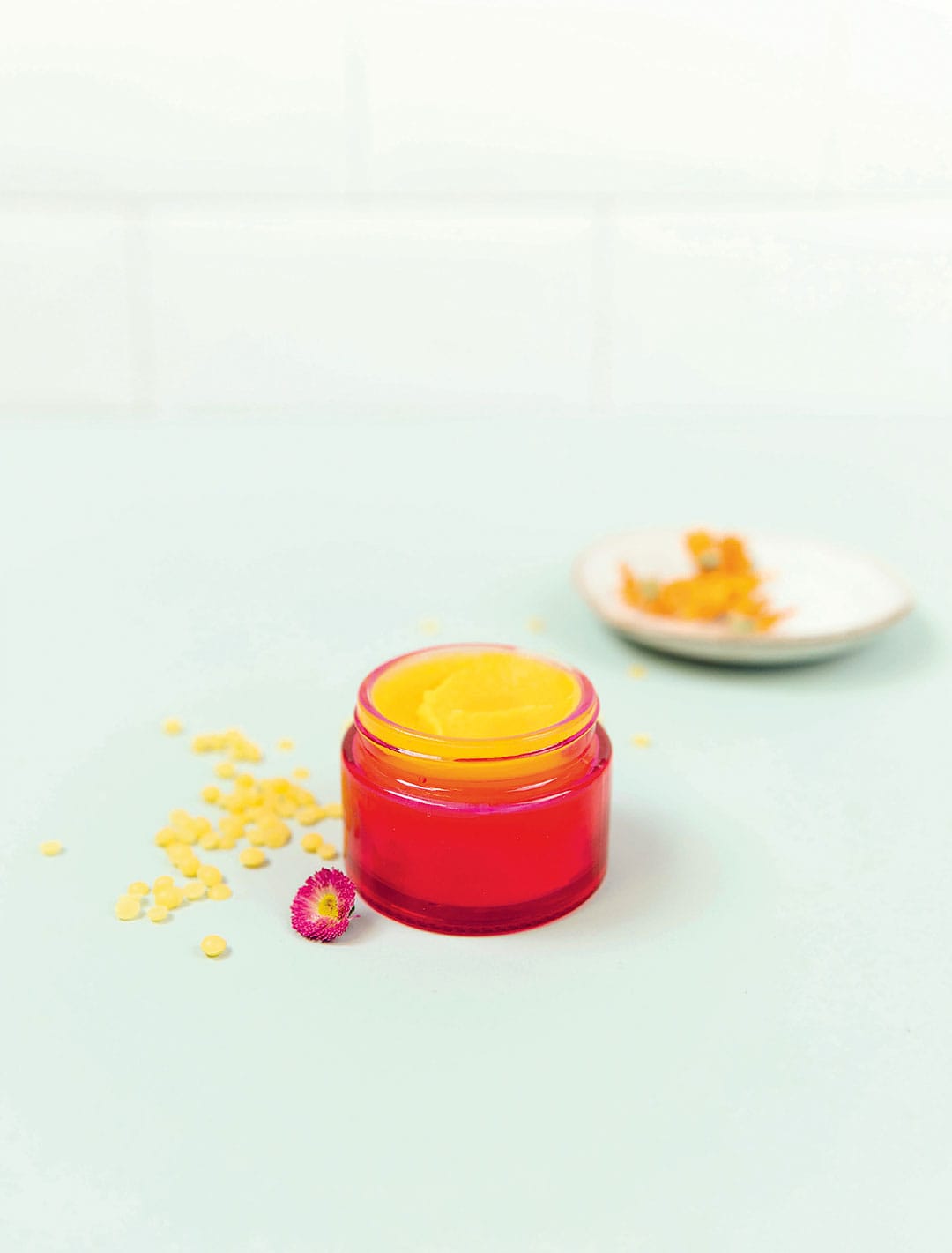Hélène Boyé, natural-care midwife shares her favourite homemade recipes for the postpartum period and beyond
Newborns have fragile and reactive skin. Most products designed for them contain high percentages of synthetic materials. Ensuring the purity and quality of the products you use for them also means protecting them.
Here I share some of my favourite homemade recipes for babycare products (that you can also use on the whole family!).

BABY BLUES AND POSTPARTUM DEPRESSION MASSAGE OIL
The baby blues is a shortlived slump and is milder than what is known as postpartum depression, which develops and worsens over time. Crying for no reason, being sad, and feeling overwhelmed or worthless are among the main symptoms. Hormonal changes, lack of family and social support, and fatigue can contribute to postpartum depression. The risk increases if the mother has previously suffered from depression. Here is a recipe that may help you, though it should not be used as a substitute for medical advice. In all cases, don’t hesitate to talk about it with your doctor.
Preparation time: 10 min
Storage: 12 months
Materials: scale
Packaging: 10 ml tinted glass bottle with dropper or pipette cap
INGREDIENTS
• 8 g hazelnut (or jojoba) oil
• 10 drops Roman chamomile essential oil (Chamaemelum nobile)
• 10 drops marjoram essential oil
• 10 drops small grain bitter orange essential oil (Citrus aurantium ssp. aurantium)
PREPARATION
Pour the ingredients one by one into the bottle. Close it, then shake it gently to mix the oils well. Wait 48 hours before use so that the active ingredients can synergize and intensify.
DIRECTIONS FOR USE
Massage immediately after breastfeeding. Apply 4 drops of oil on the solar plexus and 2 drops on the inner side of each wrist. Repeat applications twice a day until symptoms improve.

SOLID OATMEAL SHAMPOO WITH GROWTH ACTIVATOR
Some women get beautiful, shiny, strong hair thanks to the effects of hormones; others find that their hair becomes short, dull, and brittle. A few months after giving birth, the hair often loses its volume and falls out, sometimes by the handful. Don’t worry, this is completely natural!
Castor and avocado oils are known to activate blood flow to the scalp to boost hair growth, while oatmeal softens sensitive, irritated scalps.
Preparation time: 20 min
Storage: 9 months
Materials: scale, bowl, pan, spatula, silicone mold (with 100g capacity)
Packaging: none
INGREDIENTS
• 60 g SCI surfactant (a mild, vegetable-derived surfactant)
• 10 g colloidal oat powder
• 10 g castor oil
• 10 g avocado oil
• 5 g vegetable glycerin
• 5 g spring water (or nettle hydrosol)
PREPARATION
Pour all the ingredients into a heat-resistant bowl and melt them in a water bath: fill a saucepan with water, set over low heat, and place the bowl on top of the saucepan. Once the paste is thick but uniform, remove from the heat, mix gently, and pour the mixture into a silicone mold. Press firmly. Let it harden overnight at room temperature, then remove from the mold. Leave the shampoo to air-dry for 3 days before using it for the first time.
DIRECTIONS FOR USE
Wet your hair thoroughly, then rub the solid shampoo on your scalp for several seconds until you get a dense lather. Massage your scalp with your fingertips to distribute the product evenly. Rinse thoroughly.

SOS ALLPURPOSE BALM FOR NEWBORNS
This rich balm is an optimal treatment for sensitive, dry, or damaged skin. Enriched with calendula macerated oil, it nourishes, soothes, repairs, regenerates, and heals. Its natural formula is vegan and very gentle, and it is suitable for the whole family, especially newborns.
Preparation time: 15 min
Storage: 12 months
Materials: scale, bowl, pan, spatula
Packaging: 50 ml jar
INGREDIENTS
• 5 g candelilla wax
• 15 g shea butter
• 10 g calendula macerated oil
• 10 g oat oil
• 10 g avocado oil
• 2 drops natural vitamin E
PREPARATION
Combine all the ingredients in a heatresistant bowl and melt in a water bath: fill a saucepan with water, set over very low heat, and place the bowl on top of the saucepan. Remove from the heat, mix for a few seconds with a spatula, and then transfer to the jar. Leave in the refrigerator for 20 minutes to set, then let stand for 12 hours before use.
DIRECTIONS FOR USE
Scoop out some of the balm and let it melt on your fingers. Apply to the affected areas.
TIP Newborns secrete endorphins (pain-relieving substances) while sucking. Put your baby to your breast for a few minutes to soothe, calm, or lull them to sleep.
How to Care for Yourself After Birth
After the birth comes the time for new habits and a new lifestyle. It’s a time to take care of your baby and integrate your child into the family, but without forgetting to take care of yourself and your body.
It’s also a time for physical recovery and emotional adjustment. According to traditional Chinese medicine, the pregnant woman and the young mother should enjoy themselves, look at beautiful things, listen to beautiful music, and breathe in pleasant smells.
In order to properly give and provide, the mother herself needs to be well. Be attentive to your breastfeeding. Get support and advice from professionals who will be up on the latest findings and know how to talk to you about you and your baby.
Breastfeeding is a natural process, but that doesn’t mean that it’s easy in practice. Sometimes new mothers need support to help them make this connection to the baby. Don’t forget that physical, skin-to-skin contact with baby promotes the production of milk—so there’s no limit to how much you can cuddle your baby!
Newborns don’t have any habits or throw tantrums. It’s a good idea to practice babywearing - that way, you’re in physical contact as often as possible. Babywearing creates a feeling of protection and security. You can adapt your system so it makes your daily activities easier.
It’s important to keep your baby in the right physiological position: the baby should be carried vertically, with the knees higher than the pelvis, and carried relatively high, with the head in line with the spine.
Take care of yourself by drinking plenty of water or herbal tea. The body and tissues need to be hydrated, especially while breastfeeding. Fennel seed, lemon balm, and anise herbal tea promote milk production and digestive comfort for the baby. The body needs to be replenished with energy.
Keep having what you want, but without overdoing it. Drink a lot of fluids, such as fresh fruit juices, in between meals. Opt for sweet flavours like beetroot, fennel, sweet potato, and carrot. Aubergine is subtle and fresh, nourishes the skin, and stimulates physical strength. It is particularly recommended during breastfeeding.
Season your salads or cooked vegetables with cold-pressed plant oils such as sunflower, olive, and rapeseed.
MORE INSPIRATION
READ Mother and Baby Natural Care: French Wellness Secrets and Recipes for New and Expectant Mothers and their Little Ones by Émilie Hébert and Hélène Boyé (Apollo Publishers)







